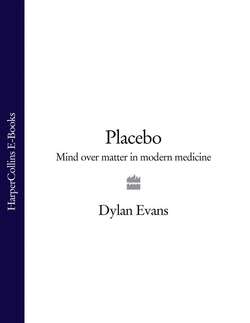Читать книгу Placebo: Mind over Matter in Modern Medicine - Dylan Evans - Страница 10
THE PLACEBO CONTROL
ОглавлениеThe pre-twentieth-century progenitors of the clinical trial established the basic principle of comparing various groups of patients undergoing different treatment regimes. The twentieth century added two more refinements: randomisation and the placebo control. Randomisation simply means that patients are assigned to the various groups on a random basis. The placebo control means that the control group is treated with a fake version of the experimental therapy – one which, ideally, should be identical in every way to the treatment being tested with the exception of the crucial component. With one or two notable exceptions, the few clinical trials that were carried out before World War II did not include a placebo control group. Rather, they compared one treatment with another, or with no treatment at all. Placebos were used as controls in the studies of effects of substances such as caffeine on healthy volunteers, but the idea of deliberately withholding a treatment believed to be active from someone who was ill and in danger of death was felt by most doctors to be unethical.
Beecher played a major role in persuading doctors that placebo controls were both ethical and scientifically necessary. He countered the ethical objections by arguing that the administration of a placebo was far from ‘doing nothing’. If placebos could provide at least half as much relief as a real drug, and often even more, then the patients in the control group would not be that much worse off than those in the experimental arm. Similar considerations were used to support the claim that placebo-controlled studies were the most sound from a scientific point of view. After all, if a therapy was simply shown to be better than no treatment at all, how could doctors be sure that the effect was not due to the placebo response? And if one therapy were compared to another and found to be equally effective, how could scientists be sure that both were not placebos? By the end of the 1950s, the work by Beecher, Gold and others had convinced most medical researchers that only by comparing a therapy with a placebo could they discover its specific effect.
Beecher argued that all kinds of treatment, even active drugs and invasive surgery, produced powerful placebo effects in addition to their specific effects. Therefore, to determine the specific effect of a treatment, medical researchers would have to subtract the placebo effect from the total therapeutic effect of the treatment being tested. If they simply compared the experimental treatment with a no-treatment control group, they would overestimate the specific effect by confounding it with the placebo effect. To support this argument, Beecher needed to provide evidence showing that the placebo effect was large enough to worry about. This was the whole point of the 1955 article whose many flaws we have briefly glimpsed. Without misquotation and systematic misrepresentation, the original studies that Beecher cited would not have provided the evidence he needed.
At the time, nobody noticed the flaws in Beecher’s article. His evidence was cited again and again in support of the placebo-controlled clinical trial, which continued its rise to dominance. Crucial in this process was the decision in the 1970s by the US Food and Drug Administration (FDA) that new drugs be tested by clinical trials before they could be licensed. As one expert on the history of psychiatry has remarked, the FDA occupies something of a magisterial role in global medicine.11 It has no legal powers to control the health policies of nations other than the United States, yet its influence is enormous. The decision of the FDA to require new drugs to prove their mettle in randomised, placebo-controlled clinical trials paved the way for similar policies in other countries. During the 1980s, scientific journals followed suit by requiring that claims for the efficacy of new drugs be backed up by evidence from clinical trials. Finally, the 1990s saw the emergence of a movement known as ‘evidence-based medicine’ whose proponents urged GPs to make use of the evidence from clinical trials in their everyday clinical practice.12
